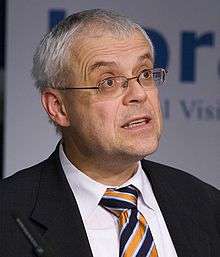Vladimír Špidla
| Vladimír Špidla | |
|---|---|
 | |
| 4th Prime Minister of the Czech Republic | |
|
In office 15 July 2002 – 4 August 2004 | |
| President |
Václav Havel Václav Klaus |
| Preceded by | Miloš Zeman |
| Succeeded by | Stanislav Gross |
| European Commissioner for Employment, Social Affairs and Equal Opportunities | |
|
In office 22 November 2004 – 9 February 2010 | |
| President | José Manuel Barroso |
| Preceded by |
Anna Diamantopoulou Stavros Dimas (Employment and Social Affairs) |
| Succeeded by | László Andor (Employment, Social Affairs and Inclusion) |
| Leader of the Social Democratic Party | |
|
In office 7 April 2001 – 26 June 2004 | |
| Preceded by | Miloš Zeman |
| Succeeded by | Stanislav Gross |
| Personal details | |
| Born |
21 April 1951 Prague, Czechoslovakia (now Czech Republic) |
| Political party | Social Democratic Party |
| Alma mater | Charles University in Prague |
| Signature |
 |
Vladimír Špidla (Czech pronunciation: [ˈvlaɟɪmiːr ˈʃpɪdla]) (born 22 April 1951) is a Czech politician who served as Prime Minister of the Czech Republic from July 2002 to June 2004 and as European Commissioner for Employment, Social Affairs and Equal Opportunities from November 2004 to February 2010. Currently, he serves as a Chief Aide to Prime Minister Bohuslav Sobotka.
Biography
Born in Prague, Špidla studied history at Charles University of Prague. His thesis was Založení Živnostenské banky (Establishment of the Entrepreneurial Bank). After his graduation in 1976, he took up a number of jobs including menial as he refused to fulfil political obligations necessary for better-qualified ones; he also worked as an archaeologist. He is married for the second time; Špidla has two sons from his first marriage and another two children acquired by marriage. His hobbies include cross-country and marathon running. He speaks German and French, but his English is weaker; this was used to call into question his qualification for the European Commission.
Political career
After the Velvet revolution he entered local politics in the town of Jindřichův Hradec where he lived and immediately joined the re-founded Czech Social Democratic Party (ČSSD, then called Czechoslovak Social Democracy). In 1991–1996 he served as the director of the district labour office. In 1992, he became a member of the Presidium of ČSSD, in March 1997 its statutory Vice-Chairman, and in April 2001 Chairman of ČSSD after its previous chairman Miloš Zeman stepped aside. In 1996 he was elected to the parliament. He was First Deputy Prime Minister and Minister of Labour and Social Affairs in the government of Miloš Zeman (22 July 1998 to 12 July 2002).
He was appointed as Prime Minister on 12 July 2002 in the coalition government of his ČSSD together with small Christian Democratic Union - Czechoslovak People's Party and Freedom Union-Democratic Union. During that time, he also held Presidential powers from 2 February 2003 until 7 March 2003, as the term of the President had ended before the Parliament could elect a new one. His government tried, with great difficulties due to tensions within coalition and its bare majority in the parliament, to introduce reforms necessary to battle the growing budget deficit; however they were criticised by the opposition and pundits as being too mild and consisting rather of increasing taxes than cutting expenses and stimulating economic growth, with the government unwilling (and partly also unable due to its precarious situation) to take radical measures. Špidla resigned as Prime Minister in June 2004 after poor results of his party and coalition in general in the European Parliament election, 2004 and loss of support within ČSSD, and officially left office on 26 July 2004. Mild economic growth during his duty as prime minister, however, continued ( GDP 3.3% in 2001, 2.9% est. in 2004). He was succeeded by interior minister and deputy prime minister Stanislav Gross whose government will however not differ much from the previous one and was officially appointed on 4 August. After a short hesitation Špidla accepted nomination to the European Commission, where he is European Commissioner for Employment, Social Affairs and Equal Opportunities as of 22 November 2004.
Špidla was considered a part of ČSSD's left wing (though he's strongly anti-communist); in foreign policy, he has always been strongly pro-European and supports further integration. His generally accepted image is a man of personal integrity and honesty (putting him at the top of Czech politicians) but a dry technocrat who couldn't communicate his undeniable statesman's vision to the public and wasn't even able to keep his own party in line as his predecessor did. His acceptance of the EC post was criticised as a "golden parachute", ousting the previous comparatively popular person, appointed by his own government, but also as running away from his battle to steer the course of ČSSD and Czech politics.
As a Commissioner, Špidla stated his desire to preserve the European social model. To do so Europe needs to preserve its "core values of social justice, equality, respect for rights and dignity for every individual."[1] His key policies were to "create more and better jobs," "reap the benefits of its enlargement," "address the impact of demographic ageing" and "promote an inclusive society."[2] He has also created a European Globalisation adjustment Fund (EGF) similar to the European Social Fund to help businesses adjust to the effects of globalisation.[3] He stood down in February 2010.
Špidla tried to return in high politics when he ran for a seat in Czech senate during Czech Senate election, 2010. He was defeated by incumbent Tomáš Jirsa (ODS.[4]
In 2014, Špidla had become Chief Aide to Prime Minister Bohuslav Sobotka
See also
References
- ↑ http://ec.europa.eu/commission_barroso/spidla/mission_en.cfm
- ↑ http://ec.europa.eu/commission_barroso/spidla/policies_en.cfm
- ↑ http://ec.europa.eu/employment_social/egf/fom_en.html
- ↑ "Špidla po prohře: Nemusím brát každou práci, budu přednášet a psát". iDNES.cz. 23 October 2010. Retrieved 1 August 2016.
External links
| Wikimedia Commons has media related to Vladimír Špidla. |
- Official biography at Czech government website – out of date
- Current official website (in European Commission)
- Interview with Špidla on labour mobility (by EurActiv)
- (Czech) Blog written by Špidla
| Party political offices | ||
|---|---|---|
| Preceded by Miloš Zeman |
Chairperson of the Social Democratic Party 2001–2004 |
Succeeded by Stanislav Gross |
| Political offices | ||
| Preceded by Miloš Zeman |
Prime Minister of the Czech Republic 2002–2004 |
Succeeded by Stanislav Gross |
| Preceded by Pavel Telička |
Czech European Commissioner 2004–2010 |
Succeeded by Štefan Füle |
| Preceded by Anna Diamantopoulou Stavros Dimas as European Commissioner for Employment and Social Affairs |
European Commissioner for Employment, Social Affairs and Equal Opportunities 2004–2010 |
Succeeded by László Andor as European Commissioner for Employment, Social Affairs and Inclusion |

